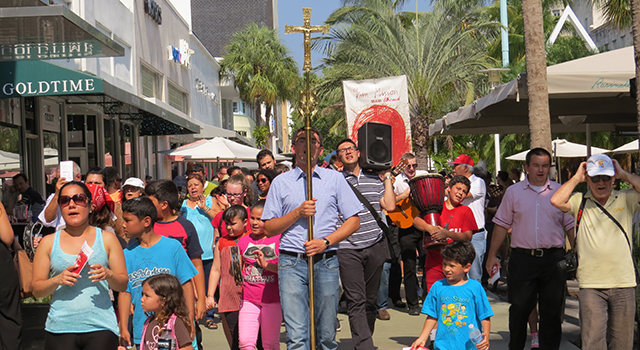By Melody Regalado - Florida Catholic correspondent
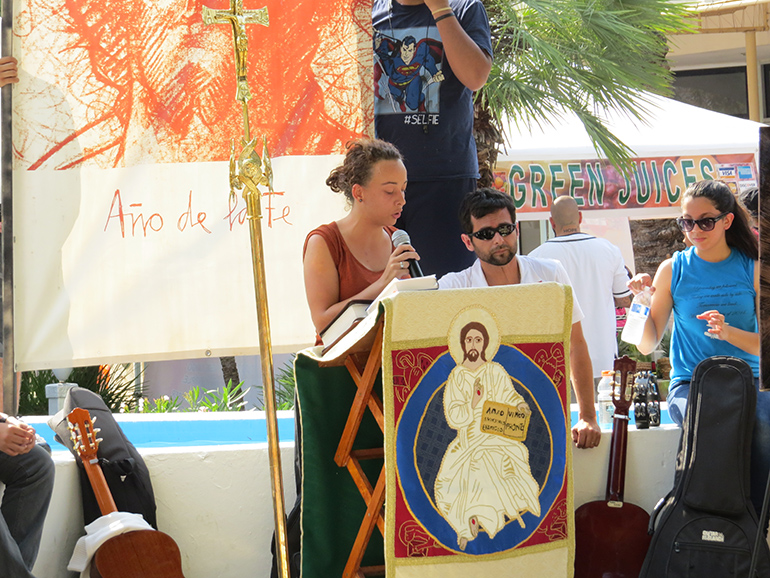
Photographer: MELODY REGALADO | FC
A member of the Neocatechumenal Way shares the story of her conversion during the group's Easter street mission in South Beach.
MIAMI BEACH | A Church where sinners find love and mercy. A Church that goes out to people in the streets. Before Pope Francis said it, members of the Neocatechumenal Way were doing it.
They did it again this year, conducting “street missions” during the five Sundays of Easter, here in South Florida and in thousands of other public squares around the world.
“We cannot wait for people to come to church; we must go to them,” said Stefano Benigni, who has led the Neocatechumenal Way in Florida since 1998.
The afternoons of prayer, testimony and catechism took place through the seventh Sunday of Easter, May 17, at various locations throughout South Florida, including Lincoln Road in Miami Beach, Tropical Park in South Miami, Walker Park in Hialeah, and on the corner of Flagler Street and 13th Avenue in Little Havana.
At the street missions, members of the way use music and dancing to create a lively, inviting atmosphere — particularly aimed at attracting youths and combating the misconception that Church is for an older crowd.
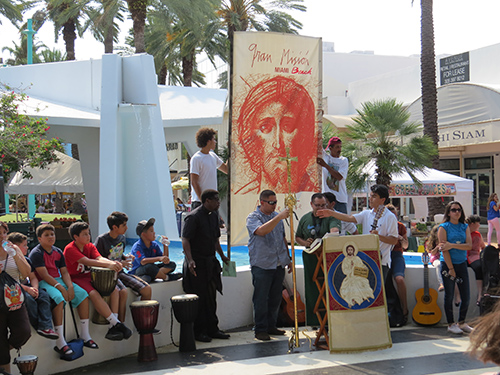
Photographer: MELODY REGALADO | FC
Members of the Neocatechumenal Way preach one of their post Easter street missions to passersby on Lincoln Road in South Beach.
The street missions began back in 2013, as the group’s contribution to the Year of Faith. Last year, 10,000 missions took place all over the world.
“The pope said that a Church that does not go outside of the doors of the church building with missionary zeal has the risk of remaining stagnant,” Benigni said. “Dozens of people, through this mission in Miami each year, are coming back to the Church.”
Neither a movement nor a cult, the Neocatechumenal Way describes itself as “an instrument” for reawakening the faith in baptized Catholics. It was created in Spain in 1964 by Kiko Argüello, a painter and psalmist, and Carmen Hernandez, a chemist and theologian. Their initial goal was to evangelize one of the poorest areas of Madrid.
“Our communities do a journey of Christian formation to reach a level of adult faith and bring these signs of love and unity to the streets, where people may see a community of people young and old, married and not married, rich and poor, together in communion,” said Benigni.
After gaining approval from Pope Paul VI in 1974, the Way has also received the blessing of subsequent popes, including John Paul II and Francis. Globally, the Neoatechumenal Way is composed of 25,000 communities in 800 dioceses and 6,000 parishes within 124 nations. The United States has 1,000 communities in 300 parishes within 75 dioceses. The Archdiocese of Miami has 35 communities in 12 parishes.
“The world is between a rock and a hard place, with seemingly no way out; people don’t see meaning in life. We are here to announce that there is meaning, that there is someone who died for all of us. We are giving this message of hope to a world that has become secularized and doesn’t believe in God,” said Harry Lopez, who has been in the Way for 16 years.
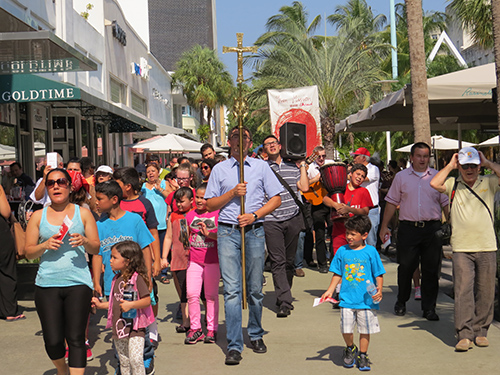
Photographer: MELODY REGALADO | FC
Members of the Neocatechumenal Way carry a cross while singing hymns through the streets of South Beach as part of their annual Easter season street missions in South Florida.
At their street missions, each Sunday’s catechism, or teaching, focused on a different theme: April 19 asked “Who is God for you?” April 26 dealt with the meaning of life. May 3 and 10 was the kerygma, a Greek word which means preaching the Good News and calling people to conversion. May 17 was about calling others to be helped by the Christian community, and priests were present to hear confessions.
During each Sunday’s event, members of the Way also share their personal testimonies.
Lopez said at age 17 he felt an emptiness inside and was looking for happiness to fill that void. He turned to dance clubs, women, alcohol and drugs, and instead found death.
His parents took him to Neocatechumenal catechisms and as a member of the Way he embarked on a journey that restored his life completely, little by little.
At one point, he said, he was afraid of marriage and having children. He now has a wife, whom he met at church and with whom he has nine kids, with another on the way.
“I’m not a saint, but through this experience I’ve come to know the love God has for me. He hasn’t repaid me with what I truly deserve, but instead with mercy,” said Lopez. “I don’t deserve to be here or to even proclaim God, but within his love and mercy, God has given me the grace to be here with my kids to proclaim him today.”
Other members said feeling out of place in this world drove them to change themselves for the sake of others, until they realized they had all the love and acceptance they needed in their families and communities.
“I’ve seen that this idea that I have to be perfect to be loved is a lie, and that I can only truly experience this love if I am not perfect, if I am the sinner that I am, and if I allow myself to be loved this way,” said 21-year-old Cecilia Eyerman, who walks with the Way at Our Lady Queen of Martyrs. “When I am humbled by situations that I’ve gotten myself into, the Lord is always there for me with open arms, and he makes something beautiful out of the mess that I’ve made.”
The group also asked passersby to share their own experiences. Benigni said that although they are sometimes met with scorn and laughs from the public, many are curious and stay to listen, and some return or even get involved.
“The meaning of life is to help people find their purpose, lifting people up and being outside of yourself. We live to let people know the truth,” said Tony Porchia, a member of the nondenominational Christ Fellowship Church in Palmetto Bay who stopped to speak with the group. “You can get to wherever you have to get to, as long as you work through love. Love others, think more of others and make sure everyone is taken care of, through Jesus.”
Benigni said that once people’s lives are changed by a personal experience with Christ, they cannot keep it to themselves. God gives them the strength to take their faith to the streets and share it with others.
“We would like to bring the love of Christ to the people we find and announce to them that God loves them unconditionally. To experience this love is truly fantastic,” he said.
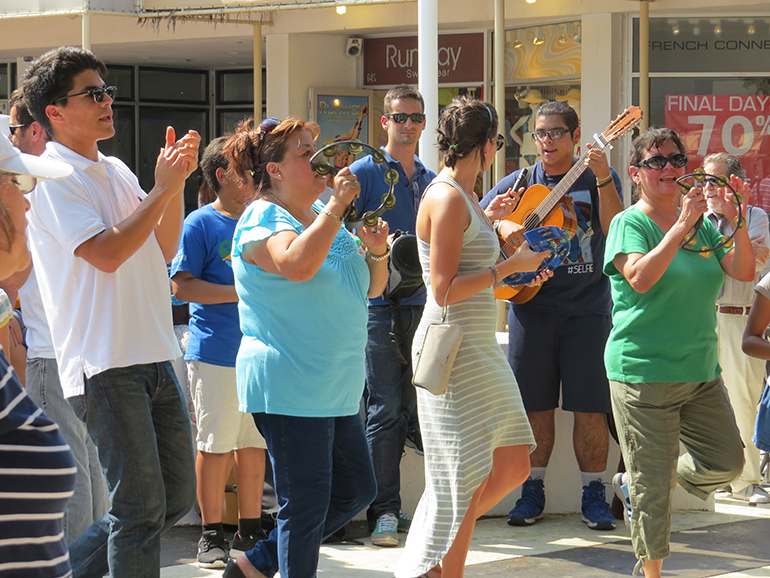
Photographer: MELODY REGALADO | FC
Members of the Neocatechumenal Way sing and dance on Lincoln Road, Miami Beach. The street missions are lively affairs aimed at attracting youths and combating the misconception that Church is for an older crowd
